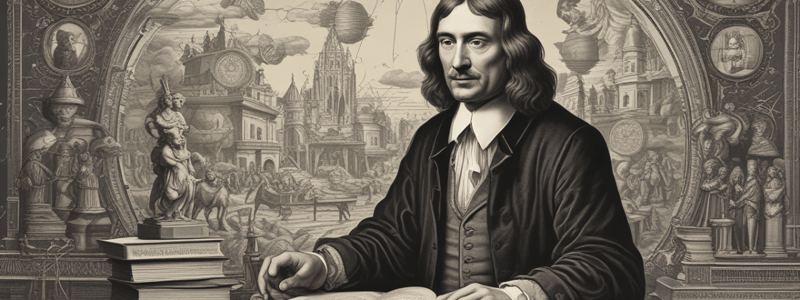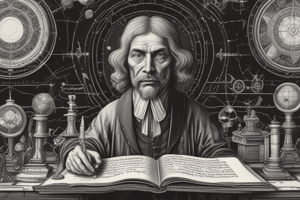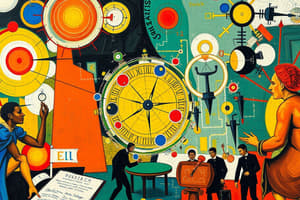Podcast
Questions and Answers
Who disproved many of Galen's assumptions about human anatomy and physiology?
Who disproved many of Galen's assumptions about human anatomy and physiology?
- Andreas Vesalius (correct)
- Robert Boyle
- Democritus
- Edward Jenner
Who developed the smallpox vaccine using cowpox to inoculate humans?
Who developed the smallpox vaccine using cowpox to inoculate humans?
- Andreas Vesalius
- Edward Jenner (correct)
- Democritus
- Robert Boyle
Who is known as the founder of modern chemistry and discovered the idea of atoms?
Who is known as the founder of modern chemistry and discovered the idea of atoms?
- Edward Jenner
- Robert Boyle (correct)
- Democritus
- Andreas Vesalius
Which scientist replaced Aristotle's idea of the 4 elements with the concept that everything is made up of atoms?
Which scientist replaced Aristotle's idea of the 4 elements with the concept that everything is made up of atoms?
Which ancient Greek philosopher believed that all things could be cut into 'uncuttable' smaller particles?
Which ancient Greek philosopher believed that all things could be cut into 'uncuttable' smaller particles?
What did Johannes Kepler contribute to the understanding of planetary motion?
What did Johannes Kepler contribute to the understanding of planetary motion?
Who improved upon the Dutch invention of the telescope and made groundbreaking astronomical observations?
Who improved upon the Dutch invention of the telescope and made groundbreaking astronomical observations?
What significant astronomical observations did Galileo Galilei make using the improved telescope?
What significant astronomical observations did Galileo Galilei make using the improved telescope?
Which scientist proposed that planets move in elliptical orbits with the Sun as a focus?
Which scientist proposed that planets move in elliptical orbits with the Sun as a focus?
What major work did Nicolaus Copernicus author regarding the structure of the universe?
What major work did Nicolaus Copernicus author regarding the structure of the universe?
Who advocated for a tricameral (three-house) government system?
Who advocated for a tricameral (three-house) government system?
According to Jean Jacques Rousseau, what form of government did he believe was ideal?
According to Jean Jacques Rousseau, what form of government did he believe was ideal?
What was Cesare Beccaria's main concern regarding the justice system?
What was Cesare Beccaria's main concern regarding the justice system?
Which philosopher advocated for the abolition of titles of nobility and believed in equality among all individuals?
Which philosopher advocated for the abolition of titles of nobility and believed in equality among all individuals?
According to Cesare Beccaria, what should be abolished in the justice system?
According to Cesare Beccaria, what should be abolished in the justice system?
Which artistic style emerged as a more elegant and simple alternative to Baroque in the late 1700s?
Which artistic style emerged as a more elegant and simple alternative to Baroque in the late 1700s?
Who was the influential figure who financed the Salon that spread Enlightenment ideas?
Who was the influential figure who financed the Salon that spread Enlightenment ideas?
Which composer is associated with the Baroque style of music and is known for works like 'Messiah'?
Which composer is associated with the Baroque style of music and is known for works like 'Messiah'?
In the 1700s, music evolved from the Baroque era into which new era?
In the 1700s, music evolved from the Baroque era into which new era?
Who among the following monarchs is known as the 'First Servant of the State' for his reforms and policies?
Who among the following monarchs is known as the 'First Servant of the State' for his reforms and policies?
Flashcards are hidden until you start studying
Study Notes
The Scientific Revolution
- The Scientific Revolution was a new way of understanding the world around us and the heavens, which emerged from the Age of Exploration and the Renaissance.
- It involved the development of the scientific method, which includes:
- Pose a question based on observations
- Form a hypothesis
- Conduct an experiment based on the data collected
- Analyze the data to reach a conclusion or new hypothesis
Key Figures of the Scientific Revolution
- Francis Bacon (1600s) introduced inductive reasoning and empiricism, emphasizing observation and experimentation to draw conclusions.
- Rene Descartes used mathematics and reason to arrive at basic truths, doubting everything except his own existence.
- Isaac Newton (1643-1727) is considered the father of modern science, creating calculus and the Universal Laws of Gravitation.
- Newton's laws of motion include:
- An object stays at rest or in motion unless another force is exerted on it.
- F=MA (force equals mass times acceleration).
- For every action, there is an opposite and equal reaction.
Scientific Instruments and Discoveries
- Zacharias Janssen (1590) invented the microscope.
- Anton Van Leeuwenhoek (1674) observed bacteria and red blood cells with a microscope.
- Evangelista Torricelli (1643) developed the first barometer, measuring atmospheric pressure and weather.
- The Royal Society (1660) and the Academy of Sciences (1666) were established to support scientific study.
- Gabriel Fahrenheit (1714) used mercury to measure temperature, with water freezing at 32 degrees.
- Anders Celsius (1742) developed a temperature scale with water freezing at 0 degrees.
Contributions to the Study of the Human Body
- Scientists relied on the Roman, Galen, to understand the body, but others made new discoveries.
- Andreas Vesalius (1543) proved many of Galen's assumptions were wrong in his work, "On the Structure of the Human Body".
- Edward Jenner developed the vaccine for smallpox in the 1700s.
- Robert Boyle is considered the founder of modern chemistry, and his law states that volume, air, and pressure affect each other.
- Boyle discovered that everything is made up of smaller particles, or atoms, as proposed by Democritus (460-370 BCE).
The Enlightenment
- The Enlightenment grew out of the Renaissance and the Scientific Revolution, questioning the role of government and rulers.
- Key figures of the Enlightenment include:
- Thomas Hobbes, who believed in the social contract and the need for a strong ruler.
- John Locke, who promoted self-government, self-determination, and the protection of life, liberty, and property.
- Voltaire, who fought for tolerance, freedom of religion, and freedom of speech.
- Baron de Montesquieu, who believed in a tricameral government and the division of power.
- Jean Jacques Rousseau, who believed in individual freedom and the direct democracy.
- Cesare Beccaria, who advocated for criminal justice reform.
The Enlightenment's Impact on Art and Literature
- The Enlightenment led to the emergence of Neoclassicism in art, characterized by elegance and simplicity.
- In literature, novels became more widely written and popular with the middle class.
- Composers like Franz Joseph Haydn, Wolfgang Amadeus Mozart, and Ludwig Van Beethoven developed the Classical era of music.
- The Enlightenment influenced monarchs, such as Frederick the Great of Prussia and Joseph II of Austria, to rule justly and implement reforms.
Studying That Suits You
Use AI to generate personalized quizzes and flashcards to suit your learning preferences.




